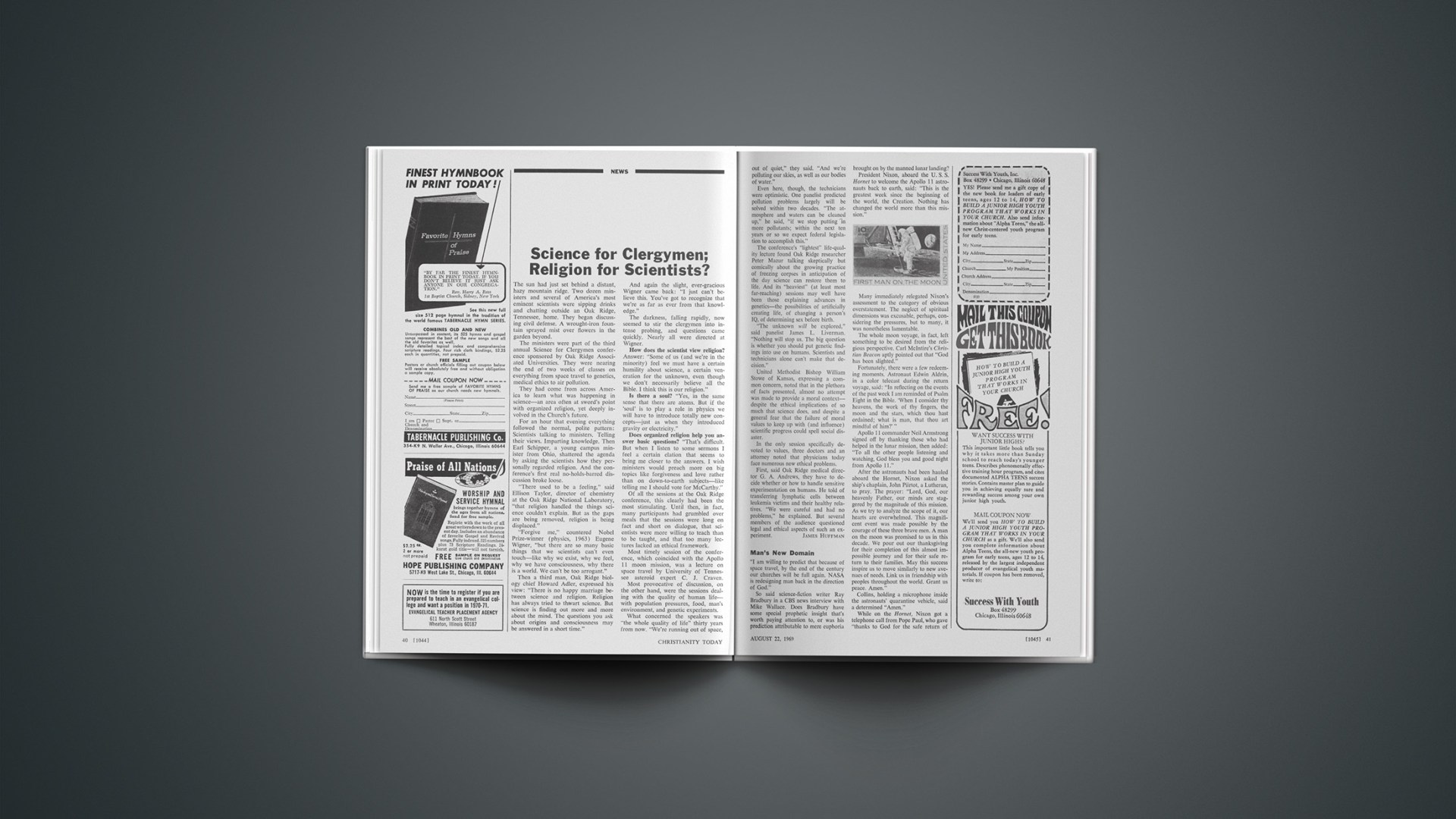As Apollo 11 streaked through space on its history-making journey, more than 200 Latin American Protestant leaders gathered at Ward College in Buenos Aires in a history-making attempt of their own. Despite months of preliminary work, however, the Third Latin American Protestant Congress (III CELA) seemed to fizzle soon after leaving the launching pad. The final “message to the churches,” which attempted to synthesize the different points of view expressed through the congress, was passed in the final session with little emotion and no debate—almost as if it were a nuisance to get out of the way before the delegates left for home.
The erratic countdown for the meeting already had foreshadowed something less than full success. Originally scheduled for Brazil in December, 1967, III CELA was postponed and rescheduled for February, 1969. Less than two months before its opening, the Brazilians decided to scrap the congress altogether. Emilio Castro, executive secretary of UNELAM, coordinating agency for ecumenical activities in Latin America, then took things in his own hands and encouraged the reliable Argentine Confederation of Churches to sponsor the meeting. Methodist minister Luis P. Bucafusco, president of both UNELAM and the Argentine Confederation, was able to resurrect the congress and complete plans.
Although Haiti and Cuba sent none, delegates came from all the Latin American republics, representing thirty-eight denominations and the Roman Catholic Church. Both the World and the National Council of Churches were represented.
During the first plenary sessions, four speakers challenged the delegates to give top priority to preaching the Gospel and to look to the Holy Spirit to change lives. “The revolution that we need in Latin America has its origin in the Spirit of Christ,” said Resende Franca of Brazil’s Daily. “It will only be produced by preaching.”
While the evangelicals applauded this emphasis, the radical theologians relaxed, knowing their hour would come. They listened in silence as former senator Jose Ferreira of Peru took a strong position in favor of economic development rather than violent revolution as the most viable solution to Latin America’s social and economic ills. He asserted that the first contribution of the Church is to change lives, and then exhorted those changed by Christ to participate fully in the social and political life of their countries.
Pentecostal Bishop Enrique Chavez of Chile decried violence as a means to political ends, declaring: “The Latin American church already possesses a much more powerful weapon which can be used at any time—the Word of God.”
The numerical advantage of the conservative evangelicals, while perhaps not reflecting fully their preponderance on a continental scale, became evident as the meetings progressed. But their lack of orientation and organization was equally evident—especially in light of the smooth-running machine the ecumenical leaders had assembled. Radical theologians were spaced throughout the six working committees and were voted into key spots as recording secretaries. Although vocal and theologically sophisticated evangelicals like Samuel Escobar and Rene Padilla, both of the International Fellowship of Evangelical Students, tempered liberal tendencies somewhat, most of the final documents were, as Latins say, ni chicha ni limonada (roughly translated: “wishy-washy”).
Perhaps the most balanced document of the congress was one that dealt with the renovation in the Roman Catholic Church without glossing over the fact that a large segment of it has not been touched by Vatican II and has resisted change of any kind.
Fireworks exploded when the findings of the committee on evangelical youth were presented. The committee had attracted a large force of radicals, but strong-minded conservatives who refused to let them carry the day also were present. The radicals won, but the evangelicals took advantage of an obscure clause in the by-laws of the congress and distributed a minority report that took a clear stand against violence and totalitarianism and condemned Communism. The conflicting reports threw the assembly into confusion. Ironically, less than an hour before, approval had been given to the “message to the churches,” including the platitude that deep unity existed among the delegates.
For many, the congress highlight was the series of six “devotional” messages presented by Ruben Lores of the Latin America Mission. From the beginning, Lores discarded the customary neutral, pablum-like messages, addressing himself instead to perplexing issues that confront the Latin American church today. His most significant address was an analysis of the sweep of Pentecostalism as a spectacular working of the Spirit of God.
Newest distinctive at III CELA was the predominant role of Latin Americans. Emilio Castro pointed out that while 52 per cent of the delegates to Lima in 1961 had been foreigners, at III CELA probably less than 20 per cent were from outside. For the first time, the Pentecostals sent large delegations, especially from Chile. At the close of the congress they startled the Episcopalian leading the service by spontaneously rising, lifting their hands into the air, and lustily shouting their threefold “Glory to God!”—perhaps the most characteristic innovation of Pentecostal liturgy.
Delegates already are looking to IV CELA, tentatively scheduled for Mexico in 1974. Speaking with regret of the lack of evangelical preparation for III CELA, one delegate said: “This congress was a vacuum for evangelicals. But when the next one comes, it will be an entirely different story.” Undoubtedly much will happen in Latin American Protestantism between now and then, but IV CELA—if it comes about—may well prove to be the accurate sounding board for the whole of Latin Amercian Protestantism many leaders have been seeking.










